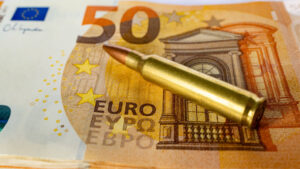Today’s video comes to you from the Okanagan region of BC – famous for its deep lakes, good wine, and (typically) blue skies.
We’re talking about agriculture today, specifically the ban that five EU countries just placed on Ukrainian exports. With Poland, Hungary, Slovakia, Bulgaria, and Romania dropping this hammer, I would expect Ukraine exports to fall by up to 90%.
Most Ukrainian exports used to go out by sea; now that Russia is cutting these lines off, rail is the next best option. However, these new bans will force exports to travel farther to Western Europe, requiring transfer to new rail cars due to incompatible gauges and adding a few extra “0s” to the bill along the way.
In addition to the cuts in exports, many of the processing capabilities that enabled Ukraine to move up the value-add chain have also been taken offline. With neighboring countries prioritizing local farmers, Ukraine is s*** out of luck.
There isn’t a quick fix for any of this either…unless the Ukrainian counter-offensive can capture all of the Crimean Peninsula…but that’s not going to happen anytime soon. While this is a devastating blow for Ukraine, its effects will be felt far and wide, with Egypt at the top of that list.
Prefer to read the transcript of the video? Click here
Here at Zeihan On Geopolitics we select a single charity to sponsor. We have two criteria:
First, we look across the world and use our skill sets to identify where the needs are most acute. Second, we look for an institution with preexisting networks for both materials gathering and aid distribution. That way we know every cent of our donation is not simply going directly to where help is needed most, but our donations serve as a force multiplier for a system already in existence. Then we give what we can.
Today, our chosen charity is a group called Medshare, which provides emergency medical services to communities in need, with a very heavy emphasis on locations facing acute crises. Medshare operates right in the thick of it. Until future notice, every cent we earn from every book we sell in every format through every retailer is going to Medshare’s Ukraine fund.
And then there’s you.
Our newsletters and videologues are not only free, they will always be free. We also will never share your contact information with anyone. All we ask is that if you find one of our releases in any way useful, that you make a donation to Medshare. Over one third of Ukraine’s pre-war population has either been forced from their homes, kidnapped and shipped to Russia, or is trying to survive in occupied lands. This is our way to help who we can. Please, join us.
CLICK HERE TO SUPPORT MEDSHARE’S UKRAINE FUND
CLICK HERE TO SUPPORT MEDSHARE’S EFFORTS GLOBALLY
TRANSCIPT
Hey Everybody. Peter Zeihan here. Coming to you from Canada’s famed Okanagan Region, an area famous for its deep lakes, it’s nice wine and its crystal blue skies. But maybe not today because it’s just as smoggy and smoky as the rest of the continent is going to be for the rest of the summer. Anyway, I want to use today as an opportunity to talk about some of the agricultural things that are going on in the Ukrainian space.
Specifically, we now have a coalition of five EU countries that have decided that they’re not going to accept any shipments any longer from Ukraine. They’ll still allow trans-shipments. So it’s not like the stuff’s completely gone now, but they’re not going to take the delivery themselves. You’ve got five countries Poland, Hungary, Slovakia, Bulgaria and Romania, all of whom are relatively significant agricultural producers for a lot of the same products that come out of Ukraine. And what’s been happening is the Ukrainians have lost the ability to do their normal export systems. Normally, they would ship everything out by water, down the Dnieper, get it packaged at a place like Nikolayev or Odessa, and then shipped out to the wider world. Or they would process it and crush it. In the case of Sunflower at home and then ship out the the intermediate product, they can’t do any of that right now. The power grid is not stable enough to do the crushing, and most of the crushing is in ports, several of which are under Russian control. And the Russians have the ability, because they have naval supremacy in the area, to prevent any sort of bulker from coming or going without their express say so.
Now there has been a deal in place that allows the Ukrainians to export somewhat. Basically the Russians insist on inspecting the bulker on the way in and the way out to make sure it’s not being used to smuggle. And that deal has basically fallen apart now. So it’s been going less and less and less over the winter, and now it’s basically defunct. And the Russians are indicating that they really have no intention of re-upping that at all. Now, this used to be 80% or almost 90% of Ukraine’s exports. You can rail stuff out. But now three problems. Number one, there’s a different rail gauge between the European Union and the former Soviet world. So that’s a problem. Know there are only so many carriages that can adjust. Number two, all of the countries that are on the edge, you know, Poland, Romania and the rest, they’re all grain exporters themselves. So when the Ukrainian stuff was coming in, it was getting dumped on the local market. Local farmers were getting quite aggro and now they can’t do that. So you can still export it through these countries to other places. But then you need twice as many rail cars that are capable of that jump, or you need a facility at the border that can shift the grain from one car to another. And those just don’t exist at scale. And now you need twice as many to get the same amount of stuff out. So all told, with these two problems in place, you’re looking at Ukrainian grain exports dropping by roughly 80 to 92%, and there’s really no way around that. The third problem is that processing stage, the Ukrainians, while always being a significant exporter of the raw stuff, also did a lot of crushing specifically for their sunflowers. Well, with that crushing now only accessible, they need to find another facility. There are facilities in all five of these countries, but they process local stuff. So once you process an agricultural commodity into things like oil, it takes up a lot less space. It’s higher value to bulk. Well, not only are the Ukrainians not able to do that now, so they get this higher bulk, lower value product, they have to send it farther. And it just takes too much effort and too much cost and there’s not enough infrastructure to support it. They’ve been trying to build out the rail system. They’ve been trying to bring in more rail cars, carriages, but it just hasn’t been enough to move the needle. And so even without the Russians deliberately attacking the agricultural infrastructure, which they are doing, you’re still looking at that 80 to 90% reduction in the ability of Ukraine to participate in the international market.
The biggest losers, aside from the Ukrainians, of course, are the Egyptians who source the majority of their imported wheat from Ukraine specifically. But there’s a large number of countries in Africa and in South Asia that source ultimately Ukrainian and to a lesser degree, Russian wheat. And we’re going to see all of them get hit to a significant degree. The question will be if we get to a point where the Russians start actually targeting shipments themselves. We’re not there yet. It’s probably just around the corner. The only way that this is going to change is as the Ukrainians get access to the water again. And that means if this counteroffensive that they’ve just launched is successful, it would have to include, at a minimum, the liberation of the entirety of the Crimean Peninsula, because most of the grain goes down the Dnieper River to Odessa. And as long as any part of that route is within range of Russian weaponry, it’s just a no go. So you’re talking about them having the Ukrainians would need to liberate the entirety of southern Ukraine and the entirety of the Crimean peninsula, and that is a very, very tall order, probably won’t happen this year, which means that any of the agriculturalists and farmers in Ukraine who get screwed this year because of a lack of export options won’t have the income that’s necessary to afford to plant next year. And assuming a runaway Ukrainian victory, it still means that Ukraine is not going to be a significant agricultural player in the world for several years. And then, of course, if the counteroffensive fails…a lot longer than that.
Well, crap. I kind of was looking for a happier topic. This is not it. I’ll try harder tomorrow. Bye..








